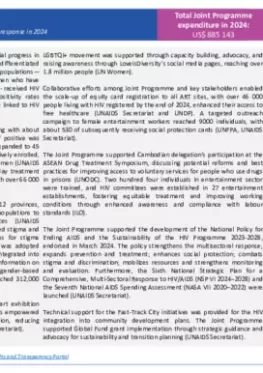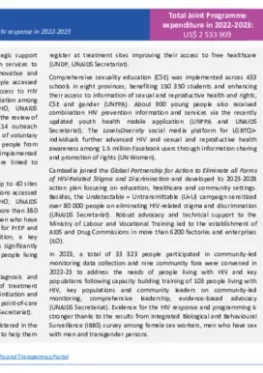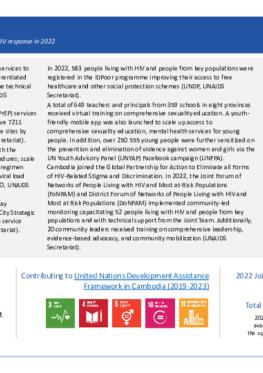|
Cambodia
With the Joint Programme’s support, Cambodia made substantial progress in HIV prevention and treatment through combination and differentiated prevention and treatment strategies. Over 137 000 key populations—including female entertainment workers, gay men and other men who have sex with men, transgender women and people who inject drugs - received HIV prevention services, with 86% accessing HIV testing. HIV positivity rates ranged from 0.5% to 3.86% and nearly all confirmed cases were linked to HIV treatment (UNAIDS Secretariat).
The Joint Programme supported the scale-up of HIV self-testing with about 5400 key populations accessed and everyone who tested HIV positive was linked to care (UNAIDS Secretariat, WHO). PrEP services were expanded to 45 sites across 15 provinces, with over 31 000 individuals cumulatively enrolled, 69% of them were gay men and other men who have sex with men (UNAIDS Secretariat, WHO). Multimonth dispensing (MMD) and same-day treatment were implemented in 74 antiretroviral treatment (ART) sites, with over 66 000 (85.4% of eligible) persons receiving MMD (WHO).
Community-led monitoring was expanded from seven to 12 provinces, strengthened the capacity of people living with HIV and key populations to address barriers to accessing HIV and related services (UNAIDS Secretariat). The National Action Plan for addressing HIV-related stigma and discrimination (2023–2028), which includes key interventions for stigma reduction in education, healthcare and community settings, was adopted (UNAIDS Secretariat). Comprehensive sexuality education was integrated into the national curriculum, reaching over 306 000 students with information on sexual and reproductive health and rights, gender equality and gender-based violence prevention. A mobile app promoting youth health reached 312,000 young people, including 100 000 active users (UNFPA).
HIV awareness was integrated into Pride Week events. An art exhibition engaged 100 young key population aged 15–24. These initiatives empowered young people to raise awareness through creative expression, reducing stigma and promoting mental health and wellbeing (UNAIDS Secretariat).
LGBTQI+ movement was supported through capacity building, advocacy, and raising awareness through LoveisDiversity’s social media pages, reaching over 1.8 million people (UN Women).
Collaborative efforts among Joint Programme and key stakeholders enabled the scale-up of equity card registration to all ART sites, with over 46 000 people living with HIV registered by the end of 2024, enhanced their access to free healthcare (UNAIDS Secretariat and UNDP). A targeted outreach campaign to female entertainment workers reached 9000 individuals, with about 530 of subsequently receiving social protection cards (UNFPA, UNAIDS Secretariat).
The Joint Programme supported Cambodian delegation's participation at the ASEAN Drug Treatment Symposium, discussing potential reforms and best practices for improving access to voluntary services for people who use drugs in prisons (UNODC). Two hundred four individuals in entertainment sector were trained, and HIV committees were established in 27 entertainment establishments, fostering equitable treatment and improving working conditions through enhanced awareness and compliance with labour standards (ILO).
The Joint Programme supported the development of the National Policy for Ending AIDS and the Sustainability of the HIV Programme 2023-2028, endorsed in March 2024. The policy strengthens the multisectoral response; expands prevention and treatment; enhances social protection; combats stigma and discrimination; mobilizes resources and strengthens monitoring and evaluation. Furthermore, the Sixth National Strategic Plan for a Comprehensive, Multi-Sectoral Response to HIV/AIDS (NSP VI 2024–2028) and the Seventh National AIDS Spending Assessment (NASA VII 2020–2022) were launched (UNAIDS Secretariat).
Technical support for the Fast-Track City initiatives was provided for the HIV integration into community development plans. The Joint Programme supported Global Fund grant implementation through strategic guidance and advocacy for sustainability and transition planning (UNAIDS Secretariat).






